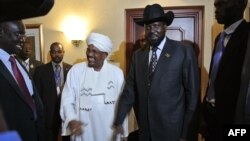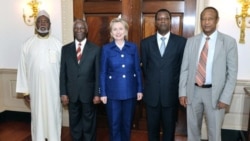The leaders of Sudan and South Sudan have resumed direct talks aimed at resolving long-running disputes between their two countries. Differences over borders, the status of the oil sector and the political future of the disputed border region of Abyei threatened armed conflict this spring. The meeting in Addis Ababa between Sudan’s President Omar al-Bashir and Salva Kiir, his counterpart from South Sudan, offers an extraordinary opportunity to demonstrate on behalf of their people a shared recommitment to peace.
The United States and its international partners call on both governments to urgently reach final agreement, as required by resolutions of the United Nations and African Union. Much progress has been made in their deliberations to date, but much more is at stake.
Since the African Union’s Roadmap for regional peace and a UN Security Council resolution on the crisis were adopted, tensions between the two neighbors have been reduced. But forces of both nations remain in dangerously close proximity along the border. While negotiators have made substantive progress in narrowing the gaps between their respective positions, serious hurdles remain to be overcome if all outstanding issues are to be resolved. It is imperative that Sudan and South Sudan agree on implementing the Safe Demilitarized Border Zone to improve security along their boundaries and allow for a monitoring mission that is already mandated. Finalizing all issues relating to the resumption of South Sudan’s oil production will provide immediate economic benefits to both nations. And hostilities in Southern Kordofan and Blue Nile states between Sudan and the Sudan People’s Liberation Movement-North must end. Stopping the violence and allowing immediate humanitarian access to those areas must be the priority of all concerned.
Final resolution of the outstanding issues and an end to the conflict in Southern Kordofan and Blue Nile will allow Sudan and South Sudan to consolidate the peace achieved by the 2005 Comprehensive Peace Agreement. It will allow both governments to shift their focus and efforts to the economic, developmental, social, and security needs of their citizens. Now is the time to show vision and courage, and deliver peace and prosperity for their nations.
The United States and its international partners call on both governments to urgently reach final agreement, as required by resolutions of the United Nations and African Union. Much progress has been made in their deliberations to date, but much more is at stake.
Since the African Union’s Roadmap for regional peace and a UN Security Council resolution on the crisis were adopted, tensions between the two neighbors have been reduced. But forces of both nations remain in dangerously close proximity along the border. While negotiators have made substantive progress in narrowing the gaps between their respective positions, serious hurdles remain to be overcome if all outstanding issues are to be resolved. It is imperative that Sudan and South Sudan agree on implementing the Safe Demilitarized Border Zone to improve security along their boundaries and allow for a monitoring mission that is already mandated. Finalizing all issues relating to the resumption of South Sudan’s oil production will provide immediate economic benefits to both nations. And hostilities in Southern Kordofan and Blue Nile states between Sudan and the Sudan People’s Liberation Movement-North must end. Stopping the violence and allowing immediate humanitarian access to those areas must be the priority of all concerned.
Final resolution of the outstanding issues and an end to the conflict in Southern Kordofan and Blue Nile will allow Sudan and South Sudan to consolidate the peace achieved by the 2005 Comprehensive Peace Agreement. It will allow both governments to shift their focus and efforts to the economic, developmental, social, and security needs of their citizens. Now is the time to show vision and courage, and deliver peace and prosperity for their nations.






